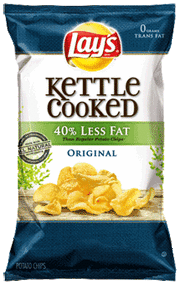
Richard Hall sued Diamond Foods, claiming that its statements about its Sea Salt Potato Chips with "40% reduced fat" were false and deceptive.
Hall claimed the reduced fat Chips are "only reduced in fat by 33%" and the phrase "40% less fat than regular Potato Chips" was deceptive because "regular Potato Chips are 'an inappropriate reference food.'"
Diamond claimed that Hall did not suggest which of the allegedly deceptive statements he read before buying the Chips. The US District Judge Maxine Chesney agreed with Diamond.
Judge Chesney dismissed the claims related to the reduced fat Sea Salt Chips, but allowed Hall leave to amend the complaint with the statements he relied on before buying them.
The judge did however refuse to dismiss the part of the suit that related to Diamond's Backyard Barbecue chips, which were advertised as "All Natural."
The statement read, "Plaintiff, relying on dictionary definitions of the words 'all' and 'natural,' alleges that the 'all natural' representations 'indicate to the average reasonable person that 'the whole extent or quantity of' the ingredients contained in the food product are 'produced or existing in nature; not artificial or manufactured. To the extent defendant argues that a reasonable consumer would not understand 'all natural' to have the meaning alleged by plaintiff, the Court finds such arguments premature."
As Hall did not allege that he read Diamond's promotional materials or looked at their website before buying the Potato Chips, Chesney dismissed the claims related to the website, granting leave to amend.
A case management conference is scheduled in Chesney's courtroom on October 31st.
This of course all sounds very confusing to the layman, and very reliant on minutiae. We wonder what would happen, given the pedantry of the counter-claim, what would happen if the claimant provided a bag of regular Chips that were less than Kettle's suggested 40%?

 RSS Feed
RSS Feed
